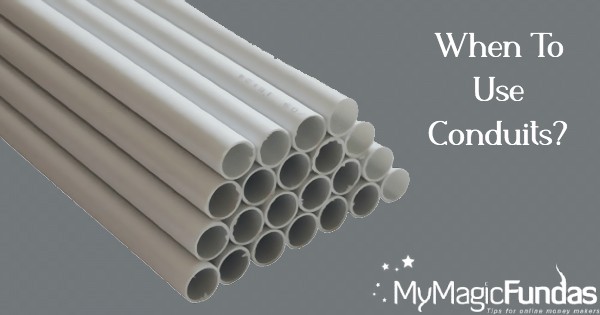
While installing electrical wiring in your office, safety should be of paramount importance. Grouping electrical wires in a protective pipe are one way to ensure safety to both the end-user and electrical components.
These protective pipes are known as conduits. Conduits help isolate wires to avoid exposure and lower the risk of short-circuits, electrocution, and other fire hazards.
Conduits also make it easy to group the wires in one place and to isolate one connection from the other. Connectivity becomes easy when you use conduits. Other benefits are easier maintenance and retaining enhanced circuit integrity.
Conduits offer protection from external elements such as fire and water. Conduits also help to enhance the aesthetic beauty of your office or workplace as they keep the wires well hidden.
Now, let’s see some of the types of electrical conduits!
Types Of Electrical Conduits
Electrical conduits are made of fiber, fired clay, metal, or plastic, and you can choose the right one that satisfies your office needs, and that is appropriate for your environment. Conduits can be placed over the walls, inside the walls, and even underground. The most commonly used cable conduits are:
- Rigid Metal Conduit – RMC
It is one of the thickest type of Conduits which is used to protect wires in underground service installations.
- Intermediate Metal Conduit – IMC
It is the lightest Conduit type which is particularly designed to safeguard the insulated electrical cables.
- Rigid Steel Conduit – RSC
It contains the thickest walls of galvanized steel with high strength which is generally used in commercial building constructions.
- Galvanized Rigid Conduit – GRC
This type of corrosive resistant Conduit is well suitable for industrial constructions.
- Electrical Metallic Tubing – EMT
To replace the heavy type Conduit, the EMT has been introduced with lightweight and more affordablity. It is used for commercial applications.
- Electrical Non-Metallic Tubing – ENT
It is a flexible type of Conduit that can easily be bended and installed with plastic fittings. It can be used inside concrete blocks.
- Flexible Metal Conduit – FMC
This Conduit is made by coiling that can be used to pull a wire. It is used in dry areas to reduce the vibration.
- Liquid-Tight Flexible Metal Conduit – LFMC
This type of Conduit is wrapped with plastic and suitable for wet areas. It is often used to get watertight sealed fittings.
- Rigid Non-Metallic Conduit – PVC
It is the lightest type of Conduit suitable for electrical wiring. It is mainly used in residential areas to withstand different weather conditions.
In this blog post, I am going to discuss when to use IMC conduits for your business.
IMC Conduit
IMC, or Intermediate metal conduit, is a rigid steel electrical conduit designed for outdoor use and sturdy connections. It is specifically designed to protect insulated electrical conductors and cables.
Although it works the same way as a rigid metal conduit (RMC), it weighs considerably less – about one-third less. It means that IMC can help you eliminate the need for a heavier-walled conduit.
When Should You Use IMC Conduits?
When you need a safe and secure connection – IMC conduits are joined with threaded couplings to ensure safe and secure connections. This feature makes IMC conduits watertight.
When you need customized sizes – IMC can be cut with pipe cutters, or a band saw and is threaded on the cut end, letting the user make whatever lengths are needed. It’s available in sizes ranging from 1/2 inch to 4 inches in diameter. It is available with or without threaded ends. It can also be easily cut, drilled, and punched, and customized in a variety of sizes.
When you need lightweight options – IMC conduits are preferable in those areas where you need a lightweight conduit. It comes with a larger interior diameter than RMC.
The smoother interior makes it easier to pull the wires through it. IMCs can be used in all applications where RMC is used. This means that IMC is suitable for several residential and commercial applications.
When you need underground wiring – IMC is especially suited for underground wiring and outdoor use. IMC conduit comes with a hot galvanized coating on the exterior and a special corrosive-resistant coating inside. This helps to prolong the conduit’s lifespan.
When you need an economical solution – IMC costs less than RMC. Since both these conduits can be used interchangeably, many people choose IMC due to its lower cost. So, if you need a conduit that will not burn a huge hole in your pocket, IMC might be a better choice.
When you need to protect your wiring from external factors – A noteworthy advantage of an IMC cable conduit installation is that it can protect your wiring from external factors like external load or impact, humidity, heat, chemicals, rodents, and harsh environmental elements such as rain, sleet, and snow.
Wrapping Up
If you need conduits in your office or residential building, IMC might be the right choice for you. It is lightweight, economical, and suitable for indoor and outdoor use, making it an ideal choice for your workplace needs.
Electrical conduits are a vital part of any commercial electrical system. But it is important to pick the right type of conduit based on your office requirements and environment.

When you need an economical solution – IMC costs less than RMC. Since both these conduits can be used interchangeably, many people choose IMC due to its lower cost. So, if you need a conduit that will not burn a huge hole in your pocket, IMC might be a better choice.